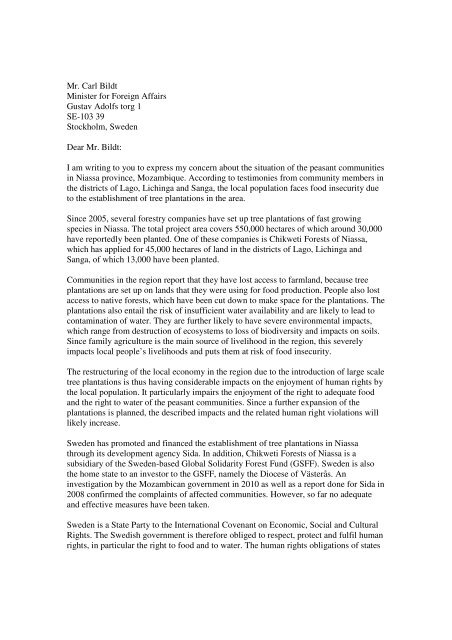2013.03 UA Mozambique letter to Bildt - FIAN
2013.03 UA Mozambique letter to Bildt - FIAN
2013.03 UA Mozambique letter to Bildt - FIAN
You also want an ePaper? Increase the reach of your titles
YUMPU automatically turns print PDFs into web optimized ePapers that Google loves.
Mr. Carl <strong>Bildt</strong><br />
Minister for Foreign Affairs<br />
Gustav Adolfs <strong>to</strong>rg 1<br />
SE-103 39<br />
S<strong>to</strong>ckholm, Sweden<br />
Dear Mr. <strong>Bildt</strong>:<br />
I am writing <strong>to</strong> you <strong>to</strong> express my concern about the situation of the peasant communities<br />
in Niassa province, <strong>Mozambique</strong>. According <strong>to</strong> testimonies from community members in<br />
the districts of Lago, Lichinga and Sanga, the local population faces food insecurity due<br />
<strong>to</strong> the establishment of tree plantations in the area.<br />
Since 2005, several forestry companies have set up tree plantations of fast growing<br />
species in Niassa. The <strong>to</strong>tal project area covers 550,000 hectares of which around 30,000<br />
have reportedly been planted. One of these companies is Chikweti Forests of Niassa,<br />
which has applied for 45,000 hectares of land in the districts of Lago, Lichinga and<br />
Sanga, of which 13,000 have been planted.<br />
Communities in the region report that they have lost access <strong>to</strong> farmland, because tree<br />
plantations are set up on lands that they were using for food production. People also lost<br />
access <strong>to</strong> native forests, which have been cut down <strong>to</strong> make space for the plantations. The<br />
plantations also entail the risk of insufficient water availability and are likely <strong>to</strong> lead <strong>to</strong><br />
contamination of water. They are further likely <strong>to</strong> have severe environmental impacts,<br />
which range from destruction of ecosystems <strong>to</strong> loss of biodiversity and impacts on soils.<br />
Since family agriculture is the main source of livelihood in the region, this severely<br />
impacts local people’s livelihoods and puts them at risk of food insecurity.<br />
The restructuring of the local economy in the region due <strong>to</strong> the introduction of large scale<br />
tree plantations is thus having considerable impacts on the enjoyment of human rights by<br />
the local population. It particularly impairs the enjoyment of the right <strong>to</strong> adequate food<br />
and the right <strong>to</strong> water of the peasant communities. Since a further expansion of the<br />
plantations is planned, the described impacts and the related human right violations will<br />
likely increase.<br />
Sweden has promoted and financed the establishment of tree plantations in Niassa<br />
through its development agency Sida. In addition, Chikweti Forests of Niassa is a<br />
subsidiary of the Sweden-based Global Solidarity Forest Fund (GSFF). Sweden is also<br />
the home state <strong>to</strong> an inves<strong>to</strong>r <strong>to</strong> the GSFF, namely the Diocese of Västerås. An<br />
investigation by the Mozambican government in 2010 as well as a report done for Sida in<br />
2008 confirmed the complaints of affected communities. However, so far no adequate<br />
and effective measures have been taken.<br />
Sweden is a State Party <strong>to</strong> the International Covenant on Economic, Social and Cultural<br />
Rights. The Swedish government is therefore obliged <strong>to</strong> respect, protect and fulfil human<br />
rights, in particular the right <strong>to</strong> food and <strong>to</strong> water. The human rights obligations of states
include extraterri<strong>to</strong>rial obligations (ETOs), according <strong>to</strong> which they have the duty <strong>to</strong> take<br />
measures <strong>to</strong> respect and protect the enjoyment of human rights in other countries.<br />
By promoting and financing the establishment of large-scale tree plantations in<br />
<strong>Mozambique</strong> and by not taking sufficient and effective measures <strong>to</strong> regulate GSFF and<br />
ensure that inves<strong>to</strong>rs do not nullify or impair the enjoyment of human rights, the<br />
government of Sweden has failed <strong>to</strong> abide <strong>to</strong> its obligations under international human<br />
rights law.<br />
I would, therefore like <strong>to</strong> ask you <strong>to</strong>:<br />
- Conduct a human rights impact assessment of the forest policy promoted by<br />
the Swedish official development aid (ODA) in <strong>Mozambique</strong>, and of the<br />
Chikweti project in particular;<br />
- Adopt effective measures <strong>to</strong> ensure cessation of violations of land rights and<br />
the right <strong>to</strong> food in Niassa as well as effective remedies;<br />
- Regulate GSFF <strong>to</strong> disclose all relevant information about its investment, in<br />
particular the exact size and location of the land titles (D<strong>UA</strong>Ts) currently<br />
acquired and applied for, as well as the environmental impact assessments;<br />
and <strong>to</strong> freeze further expansion as long as existing conflicts in Niassa have not<br />
been resolved;<br />
- Introduce moni<strong>to</strong>ring mechanisms in your embassies <strong>to</strong> track TNC activities<br />
and <strong>to</strong> receive complaints of local human rights defenders related <strong>to</strong> violation<br />
of legitimate tenure rights and human rights. This moni<strong>to</strong>ring mechanism<br />
could be build upon the EU Guidelines on Human Rights Defenders.<br />
Yours sincerely,<br />
A concerned citizen


